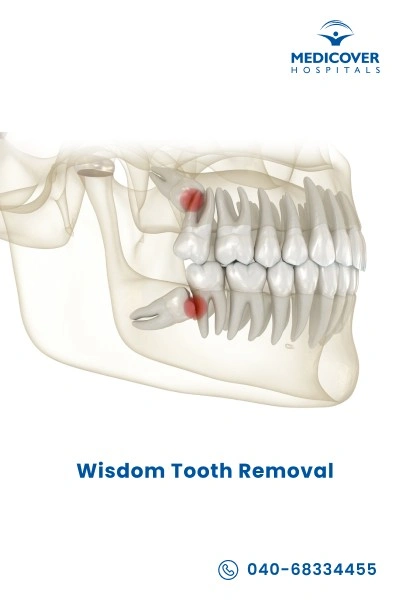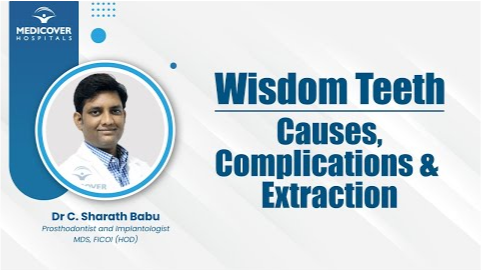What Is a Wisdom Tooth?
Wisdom teeth, also known as third molars, are the last set of permanent teeth that usually appear at the back of your mouth, typically between ages 17 and 25.
These teeth are evolutionary leftovers our ancestors needed them to chew tough, uncooked foods, but as jaws have become smaller over time, they often don't have enough space to emerge properly, which can lead to complications.
What is Wisdom Tooth Removal?
Wisdom tooth removal, also called extraction, is a routine dental surgery to take out one or more of these teeth when they cause problems or are at risk of causing them.
These third molars typically appear during the late teenage years or early adulthood, and their presence can often lead to complications due to their size, positioning, and potential for impaction.
Types of Wisdom Tooth Removal
The wisdom tooth extractions generally fall into two main categories: Simple Extraction and Surgical Extraction, with an additional option called Coronectomy for complex cases.
Simple Extraction
This method is used when the wisdom tooth is fully visible in your mouth and accessible to your dentist. After numbing the area with local anesthesia, the dentist loosens the tooth using special tools and gently removes it with force. It's a straightforward process that usually takes just a few minutes, and is the most common extraction type.
Surgical Extraction
When a wisdom tooth is partially or completely trapped beneath the gum or is misaligned (impacted), a surgical extraction is needed. In this case, the dentist or oral surgeon will make a small cut in the gum to access the tooth. Sometimes, a small piece of jawbone is removed to reach the tooth, and it may be divided into sections to make removal easier. This type involves local or sedation anesthesia and is tailored to accommodate more complex cases.
15 to 60 minutes
Surgery Duration
Local anesthesia
Anesthesia Used
Same-day discharge
Hospital Stay
1 to 3 weeks
Full Recovery Timeline

When Is Wisdom Tooth Removal Needed?
Wisdom teeth don't always need to be removed. If they're healthy, fully erupted, aligned with the bite, and easy to clean, they can often remain untouched.
However, you may need wisdom tooth extraction if they cause symptoms now or are likely to cause problems later.


Impaction & Difficulty Cleaning
Wisdom teeth that haven't fully broken through the gums (impacted) can trap food and bacteria. This increases the risk of gum infections, cavities, and tooth decay, especially when brushing becomes difficult.
Pain, Swelling, or Gum Inflammation
Recurring pain or swelling around the wisdom tooth area, known as pericoronitis, can be a sign of infection. If this happens repeatedly, removal is often the best solution.
Damage to Neighboring Teeth or Bone
Wisdom teeth that press against the second molars can cause decay, bone loss, or tooth misalignment. Over time, they may lead to cysts or tumors forming around the tooth, which can damage bone tissue.
Dental Decay or Gum Disease Around the Wisdom Tooth
Partial eruption or awkward positioning makes cleaning tricky, increasing the risk of decay in both the wisdom tooth and its neighbour. This can trigger gum disease, and removal is often the safest option.
Persistent Infections or Cysts
If X-rays reveal fluid-filled sacs (cysts) or tumors around wisdom teeth, removal is typically advised to prevent further damage.
Recurring Oral Problems or Interference with Dental Treatment
Wisdom teeth that are causing frequent infections, affecting jaw movement, or interfering with orthodontic treatments or oral hygiene may need to be removed proactively.
Age-Related Risks
Experts often recommend removal in the late teens or early 20s. At this age, the roots are not fully developed, jaw bones are softer, and recovery is usually faster and smoother.
The purpose of wisdom tooth removal is to prevent these complications, promote oral health, and ensure the overall well-being of the patient.
Preparing Checklist for Wisdom Tooth Extraction
Wisdom tooth removal is a standard outpatient oral surgery, often completed in under an hour. Proper preparation ensures safety during anesthesia, reduces risks, and sets the stage for a smoother, quicker recovery. Confirm your procedure details with your oral surgeon during your consultation so you're fully ready for surgery day.
Consultation
- Meet a dentist or oral surgeon to review your medical history, including any medications, supplements, or health conditions.
- Expect dental X-rays to assess tooth position and proximity to nerves, which helps plan ahead for potential complications.
- Discuss anesthesia options (local, sedation, general) and follow their pre-op instructions closely.
Follow Fasting & Medication Guidelines
- If your procedure involves sedation or general anesthesia, do not eat or drink for 6-12 hours beforehand, typically after midnight. This helps prevent complications with anesthesia.
- Always ask whether to continue or pause any medications like blood thinners or supplements.
Choose Comfortable Clothing & Plan Support
- On surgery day, wear loose, comfortable clothes such as sweatpants, T-shirts, and avoid jewellery or makeup.
- Arrange for someone to escort you to and from the clinic, as sedation means you won't be able to drive.
When to Contact Your Surgeon?
Seek help if you notice:
- High fever, uncontrolled bleeding, or persistent, severe pain.
- Signs of dry socket, such as intense pain at the extraction site after a few days.
- Numbness or tingling in the lip, chin, or tongue could signal nerve irritation.
What Happens During Wisdom Tooth Removal?
Exam & Preparation
First, your dentist or oral surgeon evaluates your wisdom teeth using a dental exam and X-rays to see how they're positioned and whether they're impacted (stuck under the gum or pushing on other teeth).
Anesthesia Options
Depending on your comfort and the complexity of the case:
- Local anesthesia numbs just the area around the tooth. You stay awake but don't feel pain.
- Sedation anesthesia helps you relax or feel drowsy, great if you're anxious or undergoing multiple extractions.
Removing the Tooth
Once you're numb or relaxed:
- The surgeon may need to make a small cut in your gum to reach the tooth.
- The tooth might be removed whole or cut into pieces for easier extraction.
- The area is cleaned, and if required, stitched up with dissolvable sutures.
The tooth is carefully extracted using specialised dental instruments. In cases of impacted wisdom teeth, the tooth might need to be sectioned into smaller pieces to facilitate removal.
Stitching
After the tooth is removed, the incision site is sutured to promote proper healing. Some stitches dissolve over time, while others might require removal during a follow-up appointment.
Gauze Placement
Gauze pads are placed over the extraction site to control bleeding and promote the formation of blood clots.
Post-Extraction Care
After the procedure, your dentist will provide wisdom teeth removal aftercare instructions to help manage any pain, swelling, or complications and ensure proper healing.
Who will do Wisdom Tooth Removal?
Wisdom teeth removal is a specialised dental procedure performed by professionals trained in diagnosing and treating oral health issues. Depending on the complexity of the case, the procedure may be conducted by a general dentist or an oral and maxillofacial surgeon, ensuring effective and safe removal.
- Dentists
- Oral Surgeon
- Maxillofacial Specialist
Wisdom Tooth Removal Recovery
Recovery after wisdom tooth removal involves managing pain and swelling and following aftercare instructions to ensure proper healing. While the wisdom teeth removal recovery timeline varies, most patients start feeling better within a few days. Full recovery may take up to two weeks, depending on the complexity of the surgery.
- Pain Management: Over-the-counter or prescribed pain relievers can help reduce discomfort during recovery.
- Swelling Control: Apply ice packs to the outside of the jaw to minimize wisdom teeth swelling within the first 24 hours.
- Diet Adjustments: Stick to soft foods and avoid chewing near the extraction site to prevent irritation.
- Avoid Straws: Refrain from using straws, as suction can dislodge the clot and lead to dry socket.
- Oral Hygiene: Gently rinse with saltwater, but avoid vigorous spitting to protect the healing site.
- Follow-Up Visits: Regular checkups with your dentist ensure the healing process is on track.
By adhering to post-surgery guidelines, you can speed up your recovery and reduce the risk of complications like dry socket.
Lifestyle Changes After the Removal of a Wisdom Tooth
As you continue to recover, there are certain lifestyle adjustments to consider:
- Dietary Transition: Gradually reintroduce solid foods into your diet as advised by your dental professional. Begin with soft foods and gradually move to a regular diet as tolerated.
- Oral Hygiene Continuation: Continue to maintain good oral hygiene. As the surgical site heals, you can gently clean the area using a soft-bristle toothbrush.
- Follow-Up Appointments: Attend any follow-up appointments scheduled by your dentist or oral surgeon. These appointments are crucial for monitoring your healing progress and addressing any concerns.
- Avoid Smoking and Alcohol: Avoid smoking and alcohol consumption during recovery, as these can delay healing and increase the risk of complications.
- Manage Wisdom Teeth Swelling: Apply ice packs in the first 24 hours and use prescribed pain relief methods to manage any swelling or discomfort.
Benefits of Wisdom Tooth Extraction
- Prevents infection and decay: Keeping wisdom teeth, especially those partially erupted, can allow bacterial buildup, increasing the risk of pericoronitis and cavities.
- Reduces crowding: Wisdom teeth can push other teeth out of alignment, particularly if you've had orthodontic treatment.
- Easier cleaning: Wisdom teeth are hard to reach and maintain, leading to gum disease and bad breath.
- Avoids cysts and bone damage: Impacted wisdom teeth can form cysts, risking bone and root damage. Removal prevents these complications.
- Better outcomes when young: Younger patients tend to recover faster and experience fewer complications post-surgery.
Important Risks of Wisdom Tooth Removal
- Dry socket (alveolar osteitis): A painful condition that happens when a blood clot at the extraction site dislodges. Proper care can reduce this risk.
- Infection or bleeding: Though rare, infections or extended bleeding can occur after surgery.
- Nerve damage: In rare cases, especially for lower wisdom teeth, temporary or even permanent numbness can happen if nearby nerves are affected.
- Sinus issues or nearby damage: Upper extractions may affect the sinus area, and complex cases may risk harm to adjacent teeth or jawbone.
- Extended healing in older patients: As age increases, bone density and root development slow, which can lead to delayed recovery or higher risk of complications.
- Jaw Stiffness: Difficulty opening the mouth fully due to inflammation or trauma.
Wisdom Tooth Removal Cost
The cost of removing a wisdom tooth differs widely based on:
- Type of extraction: Simple (visible tooth) vs. surgical (impacted or partially erupted)
- Location in big cities like Mumbai or Chennai generally cost more
- Clinic standards, advanced technology, and specialist clinics charge more
- Your condition, complex cases, sedation needs, and the dentist's expertise add to the cost
The General price range is Rs 3,000 to Rs 15,000 per tooth.









































